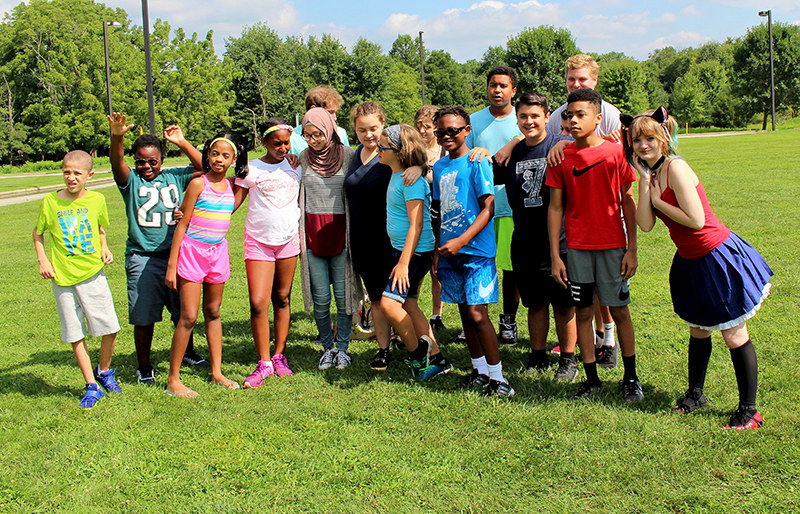Take a walk through the woodlands. Travel a nature trail. Wander through public gardens or along a riverbank.
The benefits from getting outside and engaging in outdoor activities for the mind, body and spirit are well-documented. They help to create a lasting connection to nature and wildlife that helps promote happiness and good health.
Not everyone, however, has the same access to outdoor recreational opportunities. Temple University Harrisburg is working with community partners to rectify that inequity through the new program Healing Ourselves Outside Together, or HOOT.
“Children today spend about half the time playing outdoors as their parents did and children in urban settings are at the greatest risk of not getting enough outdoor activity,” said Lindsay Price, Conference, Event, and Program Manager at Temple University Harrisburg, who will be coordinating the HOOT program. “Outdoor exercise has been shown to have tremendous benefits for children, including improved physical and mental health, lowering the severity of issues like ADHD.”
According to the proposal to develop the HOOT program, in recent years physicians have begun prescribing outdoor activity for children in programs like the Children’s Hospital of Philadelphia’s NaturePHL program. Children of color, however, have faced historical barriers to enjoying the outdoors that persist today — many national parks were segregated during Jim Crow and by 2018 only six percent of visitors identified as Black. In addition to racial barriers, children face a lack of transportation, equipment and community familiarity with the outdoors.
“The goal of HOOT is to make outdoor recreation more accessible to urban families, particularly people of color living near Temple University's campuses: the Harrisburg, Ambler and Center City campuses and Main Campus,” said Price. “HOOT is intended to provide relief particularly during COVID, when outdoor activities are the safest and when mental health is being challenged. Outdoor recreation, environmental education, and the mental and physical health benefits of nature should be accessible to all communities.”
HOOT organizers “recognize that accessibility to outdoor recreation, particularly in urban areas, has its barriers,” Price said.
“We hope to offer programming that can break down those barriers and provide the healing benefits of the outdoors — reduced stress and anxiety and elevated moods,” she said. “We know how much being in nature positively influences our own health; we just want to share that with others who may not have that opportunity.”
According to Link Martin, Director of Temple University Harrisburg, the HOOT program evolved organically from discussions among the campus staff and community partners.
“Over the last couple of years as our country has been trying to deal with inequities in society, we were exploring what can we do at a university level and campus level. We spent a lot of time at a staff level talking about how Temple can be more engaged in the community to promote equity,” he said. “One of the areas that came out in those discussions with community members is the inequity that exists in terms of accessing the outdoors. What was brought to us by some community groups is that they saw that many families of color were not taking advantage of outdoor recreational opportunities — we wanted to help them think through how a program could be developed and look for funding to encourage outdoor recreation and make it more accessible to urban families.”
HOOT has received an $85,000 grant from the Pennsylvania Department of Conservation and Natural Resources, Community Conservation Partnerships Program to begin developing programs with community partners”, said Martin. One of the partners, Let’s Go Outdoors based in Philadelphia, which is led by African American women, employs an innovative approach to overcoming barriers to bring urban families into nature by meeting them where they are and gradually expanding their comfort zone.
“We anticipate that for the rest of the winter months we will continue to work on planning for the program with the expectation that by the summer of 2022 we’ll have activities taking place. We want to make sure everyone understands their right to access outdoor recreational opportunities,” Martin said. “There is a lot of research out there on the mental and physical healing benefits of being outdoors. Certainly, the Temple Ambler Campus and the Ambler Arboretum are good examples of how we can use green spaces as places to help people in terms of mental and physical health. COVID has reinforced the need to look at outdoor spaces as places of healing.”
According to Price, implementation of the HOOT program will be a dedicated effort from departments throughout Temple University — the University College IDEA (Inclusion, Diversity, Equity Action) Committee, staff from the University campuses, Temple’s Kinesiology and Social Work programs, “and several partner organizations who will plan on-site events.”
“We have a strong relationship, for example, with Let's Go Outdoors whose co-founders, Keisha and Tarsha Scovens, will be contributing their expertise in program design and curriculum development that will provide much of the framework with this grant. Our Temple Team will be working with them to design and host a series of activities and educational workshops based on a quarterly seasonal theme,” she said. “Each theme will include online learning experiences via Zoom and adventurous outdoor activities. We want everyone, of course, to experience the outdoors but also have a full understanding of what and why they are doing the activities — education is key to fully appreciating and benefitting from the value of the outdoors.”
Price said the first HOOT online learning activities are expected to take place in summer 2022 followed by interconnecting outdoor activities in the fall and subsequent online and outdoor activities in 2023 and 2024.

